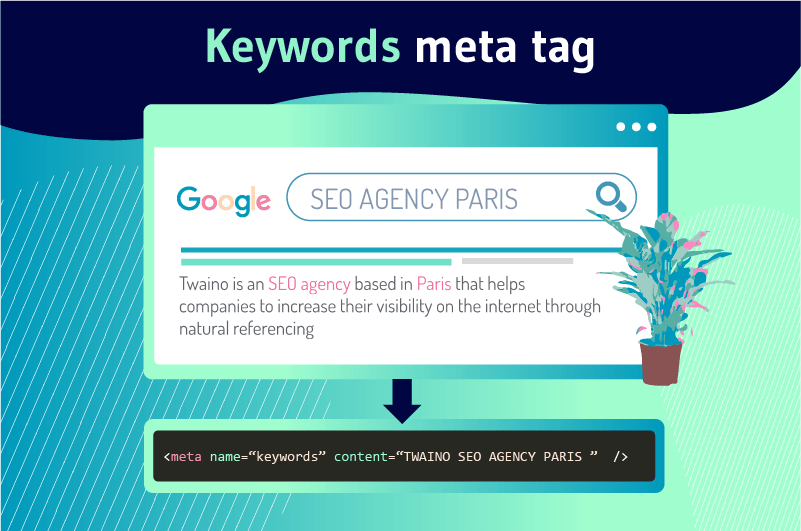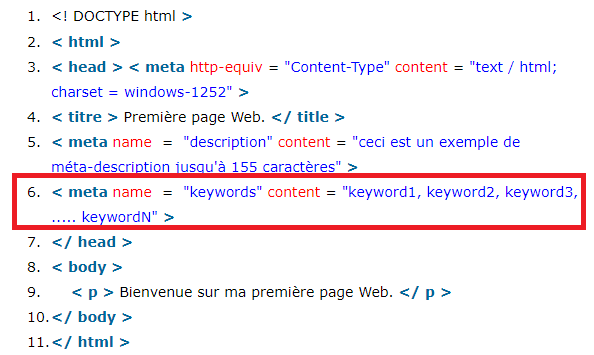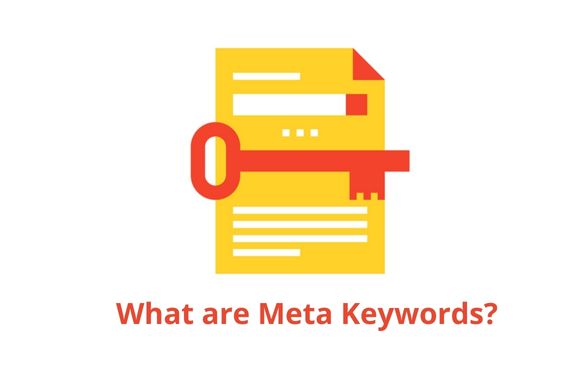Unlock the mystery of meta keywords and boost your website’s SEO with this insightful and informative blog post today!

Image courtesy of via DALL-E 3
Table of Contents
Introduction to Meta Keywords
Welcome to the world of meta keywords! In this section, we will dive into what meta keywords are, their significance in SEO (Search Engine Optimization), and how they aid search engines in understanding web content. So, let’s get started!
What They Are
Meta keywords are like little secret codes added to a webpage’s code to describe what the content is all about. They are keywords or phrases that give search engines a sneak peek into the topic of the page. Think of them as tags that help categorize and identify the content of a webpage.
Why They Matter
Back in the early days of the internet, meta keywords played a pivotal role in helping search engines understand what a page was about. Website creators would meticulously choose keywords relevant to their content, making it easier for search engines to match queries with relevant pages. This helped in improving the visibility of websites in search results.
History of Meta Keywords
Back in the early days of the internet, web creators needed a way to categorize and describe their web pages. This led to the birth of meta keywords, which are a list of words or phrases added to a webpage’s code to indicate the content it holds. These keywords were like labels that helped search engines understand what a page was about.
Changes Over Time
As the internet grew and search engines became more sophisticated, the role of meta keywords started to change. In the past, web creators could manipulate search engine results by stuffing their pages with irrelevant keywords. However, search engines caught on to this tactic and adjusted their algorithms accordingly.
Today, meta keywords have become less important for SEO as search engines like Google focus more on analyzing the actual content of a page rather than relying solely on meta tags. While they may not carry the same weight they once did, meta keywords can still be a helpful tool when used correctly.
How Meta Keywords Work
Imagine HTML as the language that computers understand to create webpages. It’s like giving instructions to a robot on how to build a website. Meta tags are like special commands that tell the robot more details about the webpage.

Image courtesy of www.twaino.com via Google Images
Adding Meta Keywords
When you want to tell search engines like Google what your webpage is about, you use meta keywords. It’s like giving the robot a list of important words. For example, if your webpage is about cute puppies, you might use keywords like “puppies,” “adorable,” and “pets.” Adding these keywords in the HTML code helps search engines know when to show your webpage in search results to people looking for cute puppies!
Meta Keywords and Modern SEO
In the world of search engine optimization (SEO), meta keywords have been a hot topic for many years. However, their importance in modern SEO practices has shifted. Let’s delve into the current relevance of meta keywords, especially in relation to major search engines like Google.
Google’s Stance
Google, being the giant in the search engine realm, no longer considers meta keywords as a ranking factor. In the past, meta keywords were heavily relied upon by search engines to understand the content of web pages. Web creators would stuff their meta keywords with any and every possible term they could think of related to their content in hopes of boosting their search rankings. Unfortunately, this led to abuse and manipulation of search results. To combat this, Google evolved its algorithms and stopped using meta keywords as a ranking factor.
Alternative Uses
While Google doesn’t use meta keywords for ranking purposes, that doesn’t mean they are entirely useless. Some smaller search engines may still consider them, and they can provide a secondary level of information about your website’s content. Additionally, meta keywords can be helpful for your own internal organization and understanding of your content. As you choose your meta keywords, think of them as descriptors or labels for your content rather than tools for ranking manipulation.
How to Choose Meta Keywords
Before selecting meta keywords for your webpage, it’s crucial to understand the content you are trying to promote. Take a moment to analyze the main topics and themes of your page. What are the key ideas that you want your audience to associate with your content? By identifying these core concepts, you can begin to brainstorm relevant keywords that encapsulate the essence of your webpage.

Image courtesy of www.wordstream.com via Google Images
Keywords Tools
Choosing the best meta keywords can be made easier with the help of keyword tools. There are many simple tools available that can assist you in finding popular and relevant keywords for your content. These tools provide insights into search volume, competition levels, and related keywords that can optimize your meta keyword selection. By using these tools effectively, you can ensure that your meta keywords align with what your target audience is searching for.
Common Mistakes with Meta Keywords
One common mistake people make when using meta keywords is overloading their content with too many keywords. This practice is known as keyword stuffing and can actually harm your website’s SEO instead of helping it. Search engines like Google have become smarter over the years and can now recognize when websites are trying to manipulate their search rankings by cramming in excessive keywords. It’s important to use keywords strategically and sparingly to avoid this detrimental tactic.
Irrelevant Keywords
Another mistake to avoid when utilizing meta keywords is including irrelevant terms that do not accurately reflect the content of your webpage. While it might be tempting to add popular keywords that are trending or widely searched, if they do not align with the actual topic of your webpage, it can mislead both search engines and users. Always ensure that the keywords you choose are directly related to the content on your page to maintain the integrity of your SEO efforts.
Other Important Meta Tags
Aside from meta keywords, there are other crucial meta tags that play a significant role in SEO and how search engines perceive your website.

Image courtesy of www.twaino.com via Google Images
Meta Title
The meta title is a crucial meta tag that defines the title of your webpage. It appears in search engine results and browser tabs, giving users a quick insight into what to expect on the page. Crafting a concise and relevant meta title can greatly impact your click-through rate and SEO performance.
Meta Description
The meta description provides a brief summary of the content on your webpage. It is displayed below the meta title in search engine results, offering users a sneak peek into the page’s content. A well-written meta description not only helps search engines understand your content better but also entices users to click on your link.
Robots Meta Tag
The robots meta tag gives instructions to web crawlers on how to index and display your webpage in search results. By using this meta tag, you can control whether search engines can index your page, follow its links, or display snippets from it. Properly configuring the robots meta tag can enhance your website’s visibility and user experience.
Practical Tips for Using Meta Keywords
When it comes to optimizing your webpage using meta keywords, there are a few practical tips that can help you make the most out of this SEO tool. Here are some actionable pieces of advice to enhance your web content:
Maintain Relevance
One crucial aspect of using meta keywords effectively is to ensure that they are directly related to the content on your webpage. It’s important to choose keywords that accurately describe what your page is about. Using irrelevant keywords may confuse search engines and lead to lower rankings. So, make sure your meta keywords are relevant and reflect the core theme of your content.
Periodic Review
Another useful tip for using meta keywords is to periodically review and update them. The digital landscape is constantly evolving, and so are search engine algorithms. By regularly revisiting your meta keywords, you can ensure that they are still relevant and in line with current trends and search patterns. This practice will help you stay competitive and maintain a strong online presence.
Summary
In this blog post, we learned about meta keywords and their role in SEO for helping search engines understand web content.

Image courtesy of www.webfx.com via Google Images
What They Are
Meta keywords are a list of words or phrases added to a webpage’s code to describe its content. They were originally used to help search engines know what a page is about.
Why They Matter
Early web creators utilized meta keywords to categorize their pages, but over time, their impact has changed in the world of SEO.
How They Work
Understanding HTML basics is essential for adding meta keywords to a webpage. By using simple HTML and meta tags, web creators can enhance their SEO.
Meta Keywords and Modern SEO
While Google no longer uses meta keywords for ranking, there are still alternative uses for them in modern SEO.
How to Choose Meta Keywords
By understanding your content and using keyword tools, you can select the most effective meta keywords for your webpage.
Common Mistakes with Meta Keywords
Common errors like overloading keywords and using irrelevant ones can harm your SEO efforts. It’s crucial to avoid these pitfalls.
Other Important Meta Tags
Aside from meta keywords, meta title, meta description, and the robots meta tag play vital roles in SEO.
Practical Tips for Using Meta Keywords
By maintaining relevance and regularly reviewing and updating your meta keywords, you can optimize your webpage effectively.
Want to turn these SEO insights into real results? Seorocket is an all-in-one AI SEO solution that uses the power of AI to analyze your competition and craft high-ranking content.
Seorocket offers a suite of powerful tools, including a Keyword Researcher to find the most profitable keywords, an AI Writer to generate unique and Google-friendly content, and an Automatic Publisher to schedule and publish your content directly to your website. Plus, you’ll get real-time performance tracking so you can see exactly what’s working and make adjustments as needed.
Stop just reading about SEO – take action with Seorocket and skyrocket your search rankings today. Sign up for a free trial and see the difference Seorocket can make for your website!
Frequently Asked Questions (FAQs)
Do I Still Need Meta Keywords?
Meta keywords were once essential for search engines to understand webpage content. However, major search engines like Google no longer use them as a ranking factor. While they may not directly impact SEO as they did in the past, some smaller search engines may still consider them. It’s always good practice to include meta keywords, but their importance has diminished in recent years.
How Many Keywords Should I Use?
There is no one-size-fits-all answer to this question. It’s crucial to strike a balance between including enough keywords to describe your content accurately and not overloading your meta keywords. As a best practice, aim for a handful of relevant keywords that succinctly represent the main topics covered on your webpage.
Can I Change My Keywords Later?
Yes, you can update your meta keywords at any time by modifying the meta tags in your webpage’s HTML code. If you find that your current keywords are not driving the desired traffic or if your content has shifted focus, it’s a good idea to refresh your meta keywords accordingly. Regularly reviewing and updating your keywords can help ensure they remain relevant and effective.







